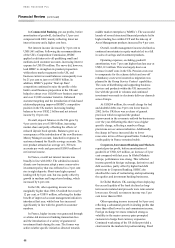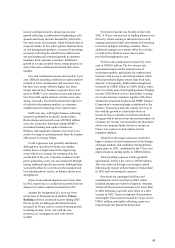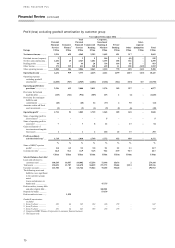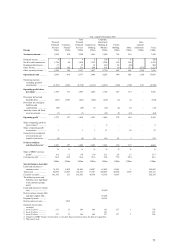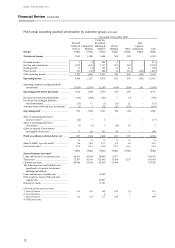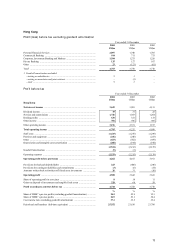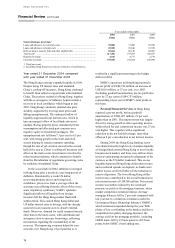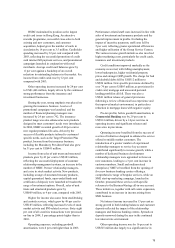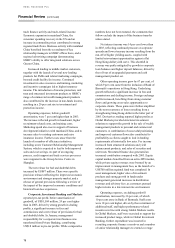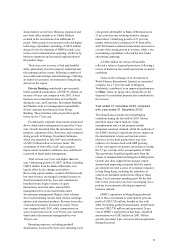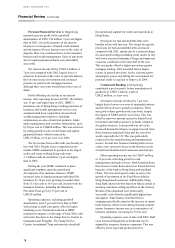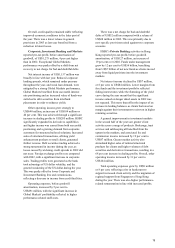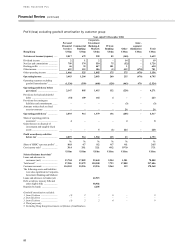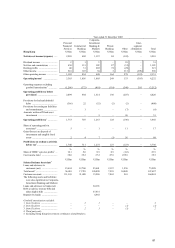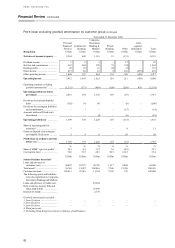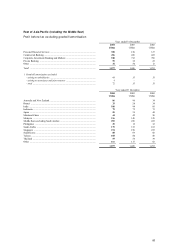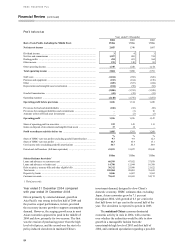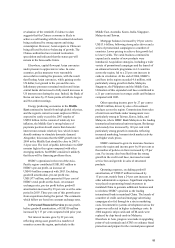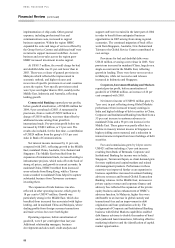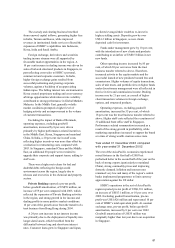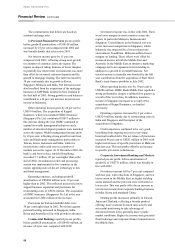HSBC 2004 Annual Report Download - page 80
Download and view the complete annual report
Please find page 80 of the 2004 HSBC annual report below. You can navigate through the pages in the report by either clicking on the pages listed below, or by using the keyword search tool below to find specific information within the annual report.
HSBC HOLDINGS PLC
Financial Review (continued)
78
Personal Financial Services in Hong Kong
reported a pre-tax profit, before goodwill
amortisation, of US$1,740 million, 2 per cent higher
than in 2002. Given the pressure on net interest
income as a consequence of muted credit demand
and the impact of lower interest rates on the value of
deposits, there was continued focus on the insurance
business and wealth management. Sales of unit trusts
and of capital-guaranteed funds were particularly
successful.
Net interest income fell by US$161 million or
7 per cent compared with 2002, largely due to a
reduction in spreads on the value of deposits taken in
the low interest rate environment and continued
pressure on yields in the mortgage business,
although there was some benefit from lower cost of
funds.
Partly offsetting the decline in net interest
income, other operating income at US$1,182 million
was 13 per cent higher than in 2002. HSBC’s
position as one of Hong Kong’s leading providers of
insurance and wealth management services was
sustained amid keen competition. Income from
wealth management initiatives, including
commissions on sales of unit trust products, funds
under management, and securities transactions, grew
by 38 per cent to US$408 million. This was achieved
by strong growth in sales of unit trusts and capital
guaranteed funds, which increased by
US$1.6 billion, or 32 per cent, over 2002.
Net fee income from credit cards was broadly in
line with 2002. Despite fierce competition in the
market, HSBC maintained its position as the largest
credit card issuer in Hong Kong with some
3.1 million cards in circulation, 9 per cent higher
than in 2002.
During the year, HSBC continued to place
significant emphasis upon the growth and
development of its insurance business. HSBC
increased sales of regular premium individual life
insurance by 59 per cent, growing its market share
from 13.9 per cent to 18.6 per cent. Income from the
insurance business, including the Mandatory
Provident Fund, grew by 53 per cent or
US$118 million.
Operating expenses, excluding goodwill
amortisation, were 5 per cent lower than in 2002,
with savings in staff costs partly offset by higher
marketing costs. Headcount reduced as HSBC
continued to migrate a wide range of back office and
call centre functions to the Group Service Centres in
Guangzhou and Shanghai. The Group Service
Centres in mainland China now provide about half
the operational support for credit card operations in
Hong Kong.
Provisions for bad and doubtful debts were
broadly in line with last year. The charge for specific
provisions for bad and doubtful debts decreased
compared with 2002, mainly due to a reduced charge
for unsecured lending (including credit cards), in line
with lower personal bankruptcy filings and improved
economic conditions in the latter half of the year.
This was partly offset by higher provisions against
mortgage lending. 2002 benefited from a higher
release of general provision. As the economy grows
and property prices stop falling the environment for
personal credit is expected to improve in 2004.
Commercial Banking in Hong Kong
contributed a pre-tax profit, before amortisation of
goodwill, of US$711 million, a fall of
US$22 million, or 3 per cent.
Net interest income declined by 7 per cent
largely due to lower recoveries of suspended interest
and the effect of lower spreads on deposits. There
was good volume growth in the loan book, despite
the impact of SARS and the war in Iraq. This was
offset by narrower spreads caused by limited local
investment and market pressure as banks competed
for quality business. Loan growth was driven by
increased demand for finance to support record trade
flows between mainland China and the rest of the
world, especially the US. This was particularly
evidenced in the manufacturing and transportation
sectors. Several new business banking/trade service
centres were opened to focus on the business needs
of small and medium-sized customers and start-ups.
Other operating income rose by US$57 million,
or 14 per cent, reflecting growth in cash
management and trade services. Both benefited from
the increase in trade flows and closer liaison between
branches of the bank in Hong Kong and mainland
China. This was developed in order to service the
growth of investment in the Pearl River delta by
Hong Kong-based customers. Additionally, Hang
Seng Bank opened its first branch in Macau aimed at
assisting customers setting-up offices in the territory.
Results of this alignment were particularly
successful, with referrals significantly higher than
anticipated. Trade finance benefited from a
campaign specifically aimed at the increase in export
trade business which occurs during the peak summer
season. Insurance income rose as a consequence of
business expansion, increasing by 36 per cent.
Operating expenses were in line with 2002. Staff
costs increased marginally as headcount rose to
support the insurance business expansion. This was
offset by lower legal and professional fees.


